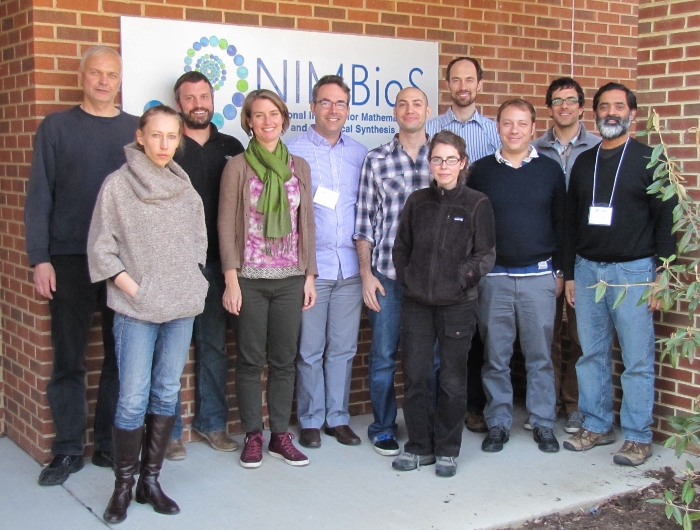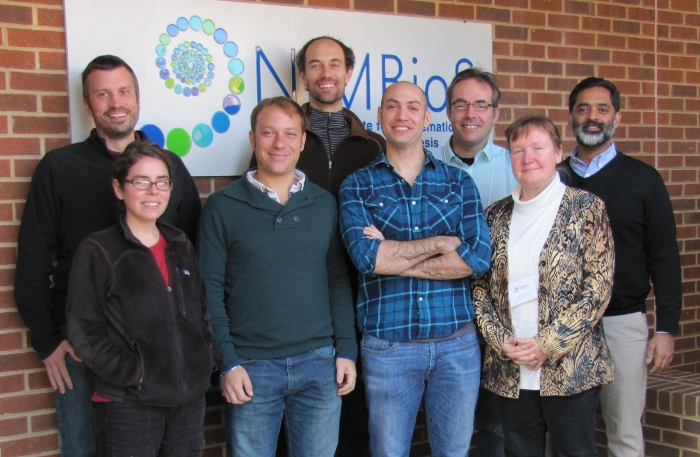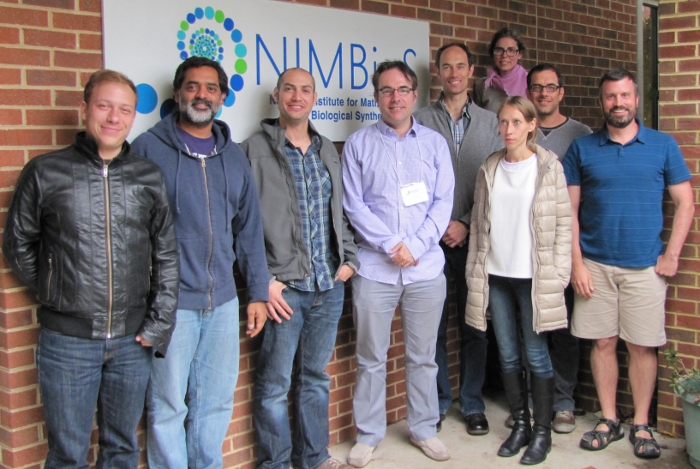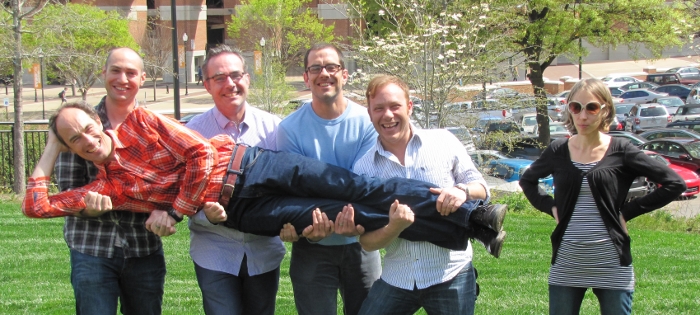| Description | Participants | Summaries | Products |
|---|
Archived NIMBioS Working Group
Evolution of Sustainability

Topic: A cultural evolutionary approach to social-ecological systems change
Meeting dates: Mar 26-28, 2014; Nov 17-20, 2014; Oct 26-30, 2015; Mar 28 - Apr 1, 2016
Organizers:
Timothy Waring, School of Economics and Sustainability Solutions Initiative, Univ. of Maine
Marco Janssen, School of Human Evolution and Social Change, Arizona State Univ.
Karolina Safarzynska, Warsaw Univ.; Institute for the Environment and Regional Development, Vienna Univ. of Economics and Business, Austria
Objectives: Understanding the processes of change in social-ecological systems is a pressing problem in our world of dwindling resources, but a unifying framework has remained absent. In particular, evolutionary theories have had little influence on ecological sustainability research. The goal of this working group is to develop a new modeling framework by integrating models of endogenous cultural evolution with models of social-ecological system change. This integration is needed for two major reasons. First, endogenous cultural change (i.e. changes in norms, values, preferences and social organization) is often rapid and may drive the overall state of social-ecological systems more than slow or diffuse environmental forces. Second, when conserving environmental resources is costly for individuals and groups, it conforms to the game theoretic definition of cooperative behavior. Cooperation can evolve through cultural mechanisms, which have been extensively studied and formalized by cultural evolution researchers. Cultural evolutionary models can therefore assist in studying the emergence and persistence of sustainable social-ecological systems.
This project brings together scholars who work on cultural evolution with modelers of social and ecological systems to develop a collaborative network on the evolutionary dynamics of social-ecological systems. Working group participants will work toward developing theoretical models of social-ecological systems dynamics, focusing on both broad principles (e.g. endogenous regime shifts, social structure emergence) and stylized resource systems (e.g. irrigation, pastoralism, fisheries, forestry). We will develop a series of models that couple environmental resource use with multilevel selection processes, following three themes of inquiry: environmental and resource dynamics; individual strategic and informational environments; and populations of organizations and their environments.
Meeting Summaries
| Mtg # | Dates | Agenda | Summary | Photo | Evaluation |
|---|---|---|---|---|---|
| 1 | Mar 26-28, 2014 | Link | Link | Report | |
| 2 | Nov 17-20, 2014 | Link | Link | - | |
| 3 | Oct 26-30, 2015 | - | Link | Link | - |
| 4 | Mar 28 - Apr 1, 2016 | Link | Link | - |
Meeting 1 Summary. Our first meeting in Knoxville was divided into three large goals across three days. The first day the group focused on developing a common understanding of the work at hand, namely employing evolutionary models, insights, and approaches relevant to culture and cooperation to sustainability contexts. We refer to this larger articulation as a cultural multi-level selection approach to sustainability science. The second day was used to find the "hinge points" with this general approach. We worked to simplify the vast amounts of complexity inherent in social-ecological systems to define workable systems, and divided into subgroups to identify key modeling opportunities. The third day continued the development and outlining of sub-group based modeling projects and concluded with a summary discussion and planning session. Four distinct project areas were identified, including evolutionary explorations of fisheries, pollution, cooperation in trade networks, and of the articulation of consumer preferences with social identities.
Meeting 2 Summary. The second meeting of the evolution of sustainability working group was focused heavily on model development. During day one we reviewed the cultural multi-level selection approach to sustainability science and developed a better description of how the models we are developing can complement current sustainability science efforts. We also reacquainted ourselves with each modeling project, sought limitations with our current approach and discussed ways to improve our structure and work efforts. This self-assessment and review resulted in a new effort and plans to synthesize our modeling projects with an eye toward benefits for sustainability science audiences led by Karin Frank and a new modeling project led by Vicken Hillis and Jacopo Baggio. Days three and four were devoted almost entirely to developing each modeling project and were spent in smaller groups. We reconvened for day four to share our progress and discuss plans and project timelines.
Meeting 3 Summary. The third meeting of the evolution of sustainability working group was devoted to model refinements, paper writing, paper submission and development of a synthesis strategy. We have four model papers at various levels of preparation including one that has been submitted. A paper led by Smaldino on a cultural evolutionary model on the intergroup dynamics of green product adoption has been submitted and rejected by Administrative Quarterly and will soon be submitted to the Journal of Mathematical Sociology. A paper modeling the evolution of interaction between using food crops to produce fuel in an international trade context by Baggio and Safarzynska has a draft manuscript. A paper with a model of the cultural transmission of disease management practices in perennial crops with a spreading disease written by Hillis and Baggio has been modified and refocused around economic and ecological outcomes instead of network structure and is being reanalyzed. A cultural multilevel selection simulation of the evolution of fishing restrictions and fishing intensity by Panchanathan and Waring has been rewritten to include individual learning using a common experience-weighted attraction reinforcement learning algorithm. The group also spent significant time developing a plan for a high-level synthesis paper. The synthesis paper will demonstrate the applied policy value of a multilevel selection approach to environmental sustainability dilemmas. The paper will feature all group authors and will include another mathematical model and simulation. An outline, model and simulation are now in draft form.
Meeting 4 Summary. The fourth and final meeting of the evolution of sustainability working group was devoted to model development and paper writing, with particular focus on two integrative papers, one of which is a theoretical overview, the other of which is a model-based integrative paper on climate policy/policy diffusion. A paper with a model of the cultural transmission of disease management practices in perennial crops with a spreading disease written by Hillis and Baggio has reached a full draft. This model is the first stage of a broader effort to apply cultural multilevel selection approaches to disease management and biosecurity issues more generally. A cultural multilevel selection simulation of the evolution of fishing restrictions and fishing intensity by Panchanathan and Waring has been simplified, removing individual learning to prioritize an earlier submission timeframe. Waring and Janssen wrote a full draft of a short integrative paper, and Smaldino and Safarsynska developed a cultural group selection model for a full-length integrative paper. During the meeting we conferred remotely with Frank, Moya and Panchanathan.

|
| Meeting 1 participants: (Back, L to R) Sergey Gavrilets, Matthew Zefferman, Marco Janssen, Tim Waring, Vicken Hillis; (Front, L to R) Karolina Safarzynska, Jenna Bednar, Paul Smaldino, Cristina Moya, Jacopo Baggio, Karthik Panchanathan. |

|
| Meeting 2 participants (L to R): Matt Zefferman, Cristina Moya, Jacopo Baggio, Tim Waring, Paul Smaldino, Marco Janssen, Karin Frank, Karthik Panchanathan. Not Pictured: Karolina Safarzynska. |

|
| Meeting 3 participants (L to R): Jacopo Baggio, Karthik Panchanathan, Paul Smaldino, Marco Janssen, Tim Waring, Cristina Moya, Karolina Safarzynska, Vicken Hillis, Matt Zefferman |

|
| Meeting 4 participants (L to R): Tim Waring (horizontal), Paul Smaldino, Marco Janssen, Vicken Hillis, Jacopo Baggio, Karolina Safarzynska. |
NIMBioS Working Groups are chosen to focus on major scientific questions at the interface between biology and mathematics. NIMBioS is particularly interested in questions that integrate diverse fields, require synthesis at multiple scales, and/or make use of or require development of new mathematical/computational approaches. NIMBioS Working Groups are relatively small (up to 10 participants), focus on a well-defined topic, and have well-defined goals and metrics of success. Working Groups will meet up to 3 times over a two-year period, with each meeting lasting up to 2.5 days.
A goal of NIMBioS is to enhance the cadre of researchers capable of interdisciplinary efforts across mathematics and biology. As part of this goal, NIMBioS is committed to promoting diversity in all its activities. Diversity is considered in all its aspects, social and scientific, including gender, ethnicity, scientific field, career stage, geography and type of home institution. Questions regarding diversity issues should be directed to diversity@nimbios.org. You can read more about our Diversity Plan on our NIMBioS Policies web page. The NIMBioS building is fully handicapped accessible.
NIMBioS
1122 Volunteer Blvd., Suite 106
University of Tennessee
Knoxville,
TN 37996-3410
PH: (865) 974-9334
FAX: (865) 974-9461
Contact NIMBioS


